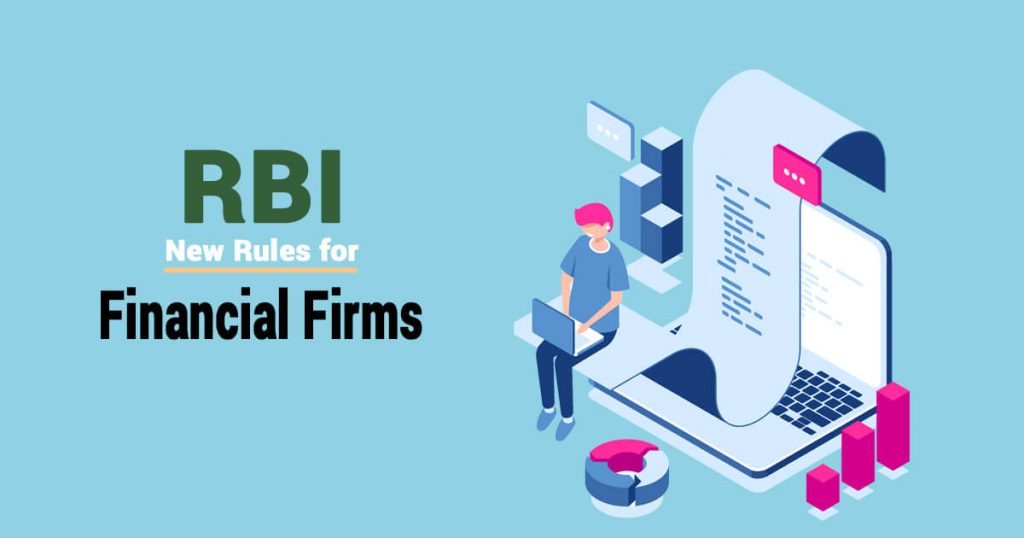How will New RBI Rules Impact Financial Firms?

Dashmeet Kaur | Updated: Oct 02, 2019 | Category: RBI Advisory
The Reserve Bank of India has recently issued new guidelines for all the financial organizations from Non-Banking Financial Companies (NBFCs) to Fin-tech firms and Housing Finance Companies (HFCs). As per the reports, the new RBI rules will play a significant part in the functionalities of these financial institutes. Let’s have a look at the different code of conduct passed by RBI for all these companies individually.
Table of Contents
New RBI Rules for Housing Finance Companies
According to the latest norms of the Reserve Bank of India (RBI), every housing finance company (HFC) would be considered as a branch of non-banking financial companies. Besides, it would also introduce some revised guidelines for mortgage lenders after completing an assessment of the regulatory framework. Here are some highlights of the whole story:
- RBI declared that until the announcement of the latest norms, HFCs must comply with the framework issued by the National Housing Bank (NHB).
- NHB will continue to reign over HFCs wherein HFCs are under obligation to submit numerous returns to NHB as hitherto.
- Also, the grievance redressal mechanism regarding HFCs will continue to be with the NHB.
- The decision of shift in the power of authority from NHB to RBI has taken by the finance minister, Nirmala Sitharaman.
- Reportedly, RBI regulatory powers over HFC get activated from 9th August.
Repercussions of RBI Supervision on HFC
- Earlier HFCs were performing business activities with light-touch regulation, but now they have to undergo intense scrutiny conducted by RBI.
- RBI got the regulatory powers to offer a liquidity window to banks to support HFCs.
- After the Infrastructure Leasing and Financial Services crisis, even renowned organizations like Indiabulls Housing Finance and Dewan Housing Finance were struggling to preserve liquidity. The revised law seems to be a ray of sunshine for the HFCs.
Now that we have perceived enough knowledge about the cause and effect of RBI new rules on HFC, it’s time to discern other organizations as well.
New RBI Rules for Non-Banking Financial Companies
- The RBI guidelines have made a compulsion on money lenders to keep additional provisioning of 20% in case a resolution plan is not carried out within 210 days from the date of default, it further inflates to 35% if it does not execute within 365 days of default. The new RBI circular does not provide any additional perk to NBFCs; rather it’s more of a drawback for them. The chairman of the Finance Industry Development Council (FIDC), Raman Aggarwal, shared his perspective on the poor condition of the NBFCs stating that:
- “Even if a borrower is paying to an NBFC, but has defaulted with a bank, the NBFC gets roped in signing an Intercreditor Agreement ( ICA) and be a part of the resolution plan.”
- Furthermore, he says that in such cases, the role of NBFCs gets highly subdued as their share in the overall value comes down to 75%. Thus, NBFCs are forced to follow the Resolution Process (RP) failing of which requires additional provisioning.
- On top of the debt norms, RBI also comes out with draft liquidity norms for NBFCs, propounding liquidity buffers for these firms.
- RBI plans to administer the liquidity coverage ratio (LCR) at NBFCs in a phased manner over four years starting from April 2020. It set aside 60% of NBFCs’ net cash outflows, as envisaged in the primary phase, into high-quality liquid assets.
- Another norm released by RBI for NBFC includes the lending model, which puts a restriction on the lending percentage of a non-banking financial company.
- As per the amendments of RBI, on-lending by NBFCs under the agriculture sector is restricted up to Rs 10 lakh per borrower.
- The limit has been increased upto Rs 20 lakh per borrower for micro and small enterprises (MSEs).
- While in the housing sector, the limit is further raised to Rs 10 lakh to Rs 20 lakh per borrower for the loan as priority sector lending.
Impacts of RBI New Rules on NBFCs
- The analyst has observed that the lending norms of RBI will have a substantial effect on the productivity of NBFCs suggesting that it could affect the returns and margins in the medium term.
- On the other hand, the draft liquidity norm is ineffective to larger NBFCs as they have already started maintaining a liquidity buffer since the IL&FS problems last year.
RBI Guidelines for Fintech
As per the new rules issued by RBI, every Fintech company is now liable to test their new products on a small group of users before scaling it up.
- For the implementation of this plan, the RBI has permitted the financial institutes and Fintech companies to set up Regulatory Sandbox (RS) for live testing of innovative products belonging to the domain of digital KYC, wealth management and retail payments.
- It will be highly useful for the Fintech companies to follow the practice of ‘learning by doing’ says RBI. By executing live testing through RS, authorities will obtain first-hand empirical evidence on the risks and benefits of emerging technologies and their implications.
- By using RS, users can test a product’s viability without having to spend on a larger and more expensive roll-out. If the product appears to have the potential to produce successful results, it will be an added benefit for the producer.
Just like a blessing comes with a disguised curse, this norm also has some aftereffects.
Limitations of RBI’s latest Sandbox norm on Fintech Companies
- Considering the risks or barriers of using RS, the RBI said that while conducting the practice of testing the innovators may feel like losing flexibility.
- The sandbox process is a time-consuming activity. Besides, running the RS in a time-bound manner at each phase can help mitigate the risk.
One can say that New RBI rules are going to be a game-changer for the financial firms. Whether atrocious or favorable, the revamped rules surely have a massive impact on NBFCs, Fintech, and Housing Finance Companies (HFCs).
Also, Read: RBI Issues New Rules for Debit and Credit Cards.















